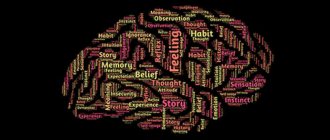Deviation is a set of deviations in personal behavior, which are based on a violation of social norms and rules. From the point of view of social science, deviations in society are a threat to security. Everyone understands this, but immoral acts and illegal actions are not uncommon today.
It is important to understand that deviation is a phenomenon that cannot be considered only as negative manifestations, because heroism or talent in a particular area is also considered a deviation from the average statistical norm. But these will be anomalies of a completely different nature.
What is deviation - concept
Deviation is a deviation from a behavioral norm. The concept of deviation is described in Efremova’s explanatory dictionary - (from Latin deviatio - deviation) deviation, change in development, condition, movement, etc. something under the influence of smb. external forces, conditions, etc. (Explanatory Dictionary of the Russian Language, edited by Efremova, 2012).
Deviation in sociology is a stable behavior of an individual, deviating from generally accepted, most widespread and established social norms, illegal actions.
The definition of deviation in social science is the motivational actions of an individual, which are fundamentally different from generally accepted values and rules of behavior in society, formed in a given culture or state.
Theories of deviation with examples from life
There are many theories of deviations, but their essence can be reduced to 3.
| Deviation theory. | Description. | Example. |
| Biological. | Cesare Lombroso worked on the theory of deviations. He studied criminology and believed that the reason for breaking the law is the innate depravity of a person. | A person exhibits deviant behavior due to high testosterone levels, genetic predisposition, extra chromosomes, and lack of brain structures that are responsible for empathy. |
| Psychological. | This theory of deviation is supported by many psychologists, including Sigmund Freud. The essence of the theory is that deviants are not born, but become deviants due to negative life conditions. | A person’s experience of moral, physical, sexual violence, psychological trauma. |
| Social. | They represent the connection between deviant behavior and the conditions of the sociocultural environment. | Quetelet studied this theory, citing as evidence the fact that crime and cruelty are developed in disadvantaged areas. |
FAQ
The following are answers to questions related to the topics and problems discussed in the publication.
How does deviant behavior affect society?
It can influence society both positively and negatively. The fact is that any deviation can be both good and bad. We showed examples in the sections devoted to the types and symptoms of deviant behavior. If you are interested, you can read their contents to understand everything. Here's a quick summary of examples: Virtue beyond measure is a positive model that has a positive impact on society; Exhibitionism is a negative pattern that, in the worst case, can mentally traumatize people.
What can provoke deviant behavior?
The formation and subsequent manifestation of the attitudes discussed in the article are influenced by many factors. It is customary to distinguish three groups of reasons: biological, psychological, social. Here are examples: biological cause - brain dysfunction; psychological – the presence of mental disorders; social – dissatisfaction with one’s own position in society. Need more examples? Then we recommend reading the section of the article dedicated to the reasons.
What are the dangers of deviant behavior?
The danger comes down to the fact that any person demonstrating it can harm not only himself, but also those around him. Often such individuals deliberately refuse to follow generally accepted norms; they deliberately distort their own morality, destroy their own morality, and more. To understand that such behavioral reactions in some cases pose a serious danger to the entire society, it is enough to remember extremists and terrorists. They are clear examples of danger.
What three reasons provoke deviant behavior in schoolchildren?
It is inappropriate to single out only 3, but if we talk about groups of reasons, we can distinguish biological, social and psychological. You can find out how and why they influence the tendency to display deviant behavior in the section “Causes of deviant behavior.” The data shown in it is valid not only for children, but also for adults. They will allow you to find a comprehensive answer to this question.
What are the signs of deviant behavior in children in the family?
To understand this, please read the sections of the article devoted to the types and symptoms of this model. In them we talk about what is typical for a person with abnormal behavioral reactions, and also show simple and digestible examples that show what is most important. In short, the child may begin to reject family values and try to impose some of his ideas on his parents. Deviant children are reluctant to listen to their parents and other adults, often play dirty tricks and do everything as they need it, without regard to the needs and requests of others.
What new types of deviant behavior have appeared in Russian society?
Under the influence of the information space in Russian society, new forms of this model of actions and behavior are often discovered among adolescents. Experts in the field of criminology, sociology and psychology most often highlight the popularization of the following five forms: alcoholism, drug addiction; conscious commission of crimes; suicidal tendencies; prostitution in non-standard forms that do not involve physical contact; sexual deviations.
Types of deviation
All deviations can be divided into two large groups - violations of generally accepted norms of social life and mental deviations .
These two large groups include different types of deviations and ways of considering them.
Social deviation
The basis of social deviation is motivation. Social deviation is the only type of deviant behavior that can be both positive and negative.
Examples of negative social deviation:
- vagabond lifestyle, lack of permanent residence;
- constantly asking for alms from others;
- trade in one's own body;
- being on the street or in public places under the influence of alcohol or drugs;
- a monastic lifestyle, in which a person renounces all earthly goods (participation in sects is also a social deviation);
- brilliant people who work for an idea (while not always looking neat, saying strange things, etc.);
- sadistic behavior, vandalism;
- lawbreakers (thieves, murderers, car thieves, etc.).
Examples of positive social deviation:
heroic deeds;
making significant scientific discoveries that completely change the life of society;
organizing rallies and struggles for equality;
geographical, historical discoveries.
Sexual deviation
It is sometimes difficult to separate sexual deviation from the norm; many sociologists and psychologists have tried to do this.
Ray Blanchard believes that normal sexual behavior is:
- oral sex;
- anal and vaginal penetration;
- masturbation, including mutual;
- kisses.
Deviation from the norm and deviant sexual behavior is considered:
- sexual interest in the products of human activity;
- desire to come into contact with persons with obvious physical disabilities;
- manifestation of sexual cruelty towards a partner (BDSM).
Gender deviation
This type of social deviation is subject to criticism and heated debate.
The essence of gender deviation is due to the fact that at birth a child is taught a certain gender model of behavior. For example, girls are dressed in light clothes, taught to preen themselves, and instilled in a love of jewelry and cosmetics. Boys are bought equipment as toys, dressed in simple and comfortable clothes, and are taught toughness in character (“be a man,” “boys don’t cry”).
These behavior patterns are subsequently reinforced. If a discrepancy occurs, it is considered a deviation and is condemned by society.
For example, they speak disapprovingly of girls who go to serve in the army or of guys who decide to wear makeup.
Communication deviations
There are a number of communicative deviations that are associated with the developmental characteristics of a particular personality:
- Autism. The phenomenon may be congenital or formed due to improper upbringing or prolonged exposure to a stressful situation. Such people strive for loneliness, they are bad at establishing contacts with society.
- Hypersociality. Hypersocial people are sensitive to loneliness; they strive to communicate with as many people as possible. Such sociability has a pathological form and differs from ordinary love to talk.
- Presence of phobias or fears. Almost all people have phobias and fears, but some of them can seriously interfere with successful social interaction. For example, the fear of blushing in public or appearing funny.
Teenage deviations
In their work, teachers and social psychologists often encounter deviant behavior of adolescents. Teenage deviations are:
- extremism, terrorism;
- violation of current legislation;
- addiction to bad habits;
- defiant appearance;
- impaired response in ordinary life situations;
- addiction to gambling;
- cruelty to animals, destruction of nature;
- severe forms of egoism, egocentrism;
- desire to minimize social contacts;
- habit of swearing and using foul language;
- ignoring the words of adults, their comments and demands;
- inability or unwillingness to control one’s own behavior;
- constant interruptions in mood, which lead to disruption of the nervous system;
- aggression, desire to damage oneself;
- the desire to solve any problems through a fight;
- attempts to die.
Teenagers can also demonstrate positive deviations:
- increased talent, genius, success in the fields of science or art;
- high level of patriotic education;
- performing significant actions for the benefit of society;
- the ability to sacrifice oneself for the sake of a common cause or the good of another person;
- a desire to help others, a heightened sense of mercy, self-sacrifice;
- high degree of hard work, sense of duty;
- unique human abilities.
Character traits
Positive deviant behavior is often associated with a person's strong passion for a particular area.
It is common to have a desire to prove your point of view to the bitter end - what we call genius or giftedness.
Example
People. whom we call geniuses, prodigies, extraordinary personalities, have unsurpassed abilities in some field of science or art and are very passionate about it. Their psyche is aimed at solving problems classified as “high”. For example, creating new devices or pieces of music. Outwardly, it looks like an obsession with what you love. However, the psyche of such people is structured in a special way. They exist simultaneously in two worlds, and the inner one is more important for them, and the main one for everyone else, the outer one, is in the background, insignificant. Therefore, such people cannot solve tasks that are simple in the opinion of the majority or ignore the necessary, in the general opinion, needs.
Example
Positive deviants can be not only people with special abilities, but also those with an interest focused on one area. Monks also put the outside world in second place, are reluctant to make contact, and live separately. They don't bring negativity into the world. On the contrary, they often develop strong empathy and help those whom ordinary people might ignore - they work with the homeless, go on missions to places of mass infection with dangerous diseases, etc.
Such typical manifestations of the behavior of geniuses in everyday life characterize positive deviation.
Refusal to start a family
People with deviant behavior come to this decision easily. The reason is still the same: the inner world is more important for them, they try to get involved with the outer world as little as possible
Therefore, they cannot establish long-term relationships with people, they are not able to pay attention to something or someone else. They tend to focus exclusively on their chosen area
For such people, the question of choosing between family and life’s work is not worth it at all.
This is important to consider for people who want to connect their lives and start a family with such a person. His spouse will have to bear the entire burden of household chores, raising children, and at the same time put up with the fact that the main focus of the other half will never be directed at him/her
Few agree to take on such a burden. That's why geniuses are often lonely. But this does not bother them as much as people with normal deviation.
Monks deliberately abandon family for the same reasons: it is not as important to them as the work to which they dedicated their lives and the world in which they believe
From everyday comfort
It is also easy for such people to give up some of the household amenities that most people consider necessary.
Geniuses may not notice that they haven't eaten or washed in 3 days or that their nails and hair are not in order.
Monks live in very simple conditions, devote little time to sleep and rest, eat poorly, dress simply and monotonously, and may not maintain a sufficiently warm temperature in the room, deliberately depriving themselves of these primary needs for an ordinary person.
Both of them often refuse recognition of their achievements, prizes, titles, money, fame and fame
This is external, so it doesn’t matter to them either
Low practicality in everyday matters
Geniuses are first-class specialists in their chosen field. But they may not know how to use household appliances or how to buy groceries in a store. This is very typical of positive deviants.
Monks, those who are deviants, often also do not know how to do simple things: use a mobile phone or computer, choose clothes, cook. Because in their ordinary life they do not do this.
Forms of deviation
Forms of deviation are divided into positive, negative and neutral .
Negatively colored deviation is various types of addiction, violations of the law, and cruel behavior.
Positive deviation can include donating benefits for the development of society, performing any significant work for free.
Socially neutral deviations include reluctance to start a family, excessive shyness or isolation.
Social control as a mechanism for regulating deviations
Social control is a set of formal and informal measures aimed at preventing deviant behavior of an individual. This is a set of some means by which society or its individual group guarantees the normal behavior of its members.
Note 2
Sanctions of society or groups of people can be formally positive and negative. Positive measures include measures that stimulate the individual to behave positively.
Such measures include the assignment of various titles, awards, bonuses, and career advancement. Formally, negative measures can be considered the imposition of fines, dismissal from work, arrest, and others. Sanctions can also be informal: public reward (praise), punishment (disapproval of the team, threat). There is also such a phenomenon as a revaluation of existing norms, that is, actions that were previously considered deviant become acceptable for society.
Types of deviation and examples
In modern science, Merton identified deviation, which can be divided into 5 types.
| Type of deviant behavior. | Description. | Example. |
| Delinquent type. | Causing some harm to others and society in order to have fun or draw attention to oneself. Sometimes these are illegal actions, frivolous acts (they can be committed at the suggestion of other people). Often this behavior is demonstrated by people with unresolved internal conflicts. | Rock musicians who cause riots or engage in vandalism. |
| Addictive type. | A person wants to change his condition artificially in order to be able to escape reality (taking psychoactive substances, drugs, alcoholic beverages). A person in real life cannot find activities and emotions that would satisfy him. | Many creative people had addictive behavior: Lewis Carroll, Honore de Balzac, Edith Piaf, Mikhail Bulgakov, William Faulkner, Truman Capote. |
| Pathocharacterological type. | A person’s behavior is caused by changes in his character due to improper upbringing or lack thereof. This is often characterized by personality disorders or character accentuations. | A person with a schizoid personality type stops communicating with friends, parents and colleagues without explanation. |
| Psychopathological type. | This is a manifestation of mental disorders and diseases. A person suffers from hallucinations, thinking disorders, and commits actions incomprehensible to a healthy person. | The main character of the movie "Split" or the book "The Many Minds of Billy Milligan." |
| Based on hyperpowers. | A person exists in parallel in two worlds, his own and the real. A person perceives the real world as not too significant; he tries not to interact with it. Usually such people are eccentric and do not want to enter into close contacts or close relationships with them. | Alexander Suvorov woke up every night at exactly 2 o’clock to douse himself with cold water and crow like a cock. He could meet guests in only his underwear. |
There is another classification of types of deviant behavior.
| Type of deviant behavior. | Characteristic. | Example. |
| Innovator. | People want to succeed in society and be full members of it, but they prefer to follow their own path of development. | Creators of financial pyramids, businessmen, cooperators. |
| Ritualists. | Such people often bring social principles to the point of absurdity and try to change the existing system. | Citizens who regularly organize rallies and strikes. |
| Retreatists. | Escape from existing reality, the desire to escape from reality, rejection of generally accepted goals and ways of their implementation. | People without a fixed place of residence, drug addicts, alcoholics, tramps. |
| Revolutionaries. | People who are not satisfied with the existing social system, they want to replace it with a new one. | There are many revolutionaries among historical figures: Vladimir Lenin, Leon Trotsky, Karl Marx, Fidel Castro and others. |
What do you think about types of deviant behavior? Do you know any interesting examples? Be sure to share them in the comments, and we’ll discuss them together.
How to recognize a deviant
To better understand what deviant behavior is, you need to familiarize yourself with its manifestations or symptoms, which will tell you that this is a deviant. Even if you don’t know a person well, you just met him recently, deviations will be visible even in small things.
For example, with delinquent behavior, the individual has little idea of what laws, norms and rules are. In a comic form, he can steal chewing gum at the checkout of a hypermarket, get angry at a person who accidentally stepped on his foot, and verbally demonstrate disagreement and rebellion.
Addictive behavior is often accompanied by delinquent behavior, but can also exist independently. Such people are very vulnerable, do not tolerate loneliness well and are easily influenced. In this case, an example of deviant behavior is street groups of teenagers who use drugs and engage in robbery.
Signs of psychopathological manifestations are delusional thoughts, hallucinations, idefix, illusory perception of reality. And the destructive form of deviations is manifested by various types of aggression, directed both inward and outward.
All manifestations can be identified in a separate list:
- problem in adaptation , frequent conflicts, belonging to “bad” companies”;
- scattered attention , leaving things halfway, lack of responsibility;
- infantilism, untidiness in clothing and household activities;
- mental disorders in the form of phobias, anxieties and other neurotic manifestations;
- Typical manifestations of deviant behavior are also low self-esteem and lack of self-confidence;
- poor health, pain, psychosomatic symptoms, sleep problems;
- isolating oneself from society, frequently leaving home in order to be alone ;
- impulsive behavior, stubbornness, negativism, aggression;
- atypical inclinations and interests (for example, passion for extreme sports).
Signs of deviant behavior
In modern society, a number of rules and norms of behavior have been adopted. Violations are signs of deviation, deviant behavior:
- Aggressiveness, too tough temperament.
- An increased form of egocentrism.
- Inability to adequately perceive criticism and respond to it.
- Changes in mood for no apparent reason.
- Inability to independently control one’s speech and actions.
- Inability to take care of yourself.
- Increased isolation, desire to constantly be alone.
- Mental or psychosomatic system disorders.
- Communication with criminal personalities, a person’s connection with the criminal world.
- A person's desire to aggressively oppose the opinions of the majority of members of society.
Reminder about deviation
Causes of deviation
Psychologists identify quite a few reasons for the emergence of deviation:
- genetic predisposition to deviant behavior;
- adolescence (the individual is formed, often through deviant behavior he learns the boundaries of what is permitted in society);
- low level of intellectual development of the individual;
- certain character traits (tendency to rebellion, aggression, opposition);
- unfavorable financial situation in the family or region of residence;
- pronounced social inequality;
- unstable political situation in the country;
- raising a child in disadvantaged conditions;
- serious mistakes in education;
- reluctance of parents to work on the moral education of the child;
- child copying incorrect patterns of behavior;
- the inability of the individual to successfully socialize;
- high levels of stress;
- disorders of the brain or central nervous system;
- psychosomatic problems, disorders;
- difficulties in choosing the only correct model of behavior (parents say one thing, friends say another, TV says something else);
- inability to realize one’s interests and needs;
- confidence in one’s own impunity, manifestation of permissiveness;
- the habit of shifting responsibility for one’s life to other people;
- the desire to become famous, but the inability to achieve recognition in the field of art, science, sports, etc.;
- desire to gain approval from the company;
- the desire to look cool and mature in the eyes of others;
- destructive desire to change the world.
We invite you to watch a video lecture on the influence of the Internet on deviant behavior.
Stages of formation
The main stages and causes of deviant behavior are laid down in adolescence. A person gets to know himself, asserts himself, strives to stand out from other people.
At the first stage, a person demonstrates deviant behavior that is not approved in a particular society (plays pranks in class, talks loudly, hooligans on the street). Usually behavior is corrected by educators, teachers or parents. If measures were not taken at the first stage, then over time the violations may become more significant.
At the second stage, the teenager commits clearly condemnable deviant behavior (swears, fights, mocks classmates). Disciplinary measures must be taken against such a child.
At the third stage, deviant behavior takes root, the person regularly demonstrates deviations in his words and actions. His behavior can be characterized as morally negative (he is regularly rude to teachers, refuses to do homework, disappears on the street until late). Such a teenager needs systematic correctional work.
At the fourth stage, the individual’s behavior can be characterized as illegal, with regular relapses (vandalism, hooliganism, petty theft). Specially trained people (social educator, law enforcement officers, psychologist) should work with such minors.
The fifth stage is the criminal behavior of the individual. Typically, work with such adolescents is carried out in special closed correctional institutions.
Prevention of deviant behavior
To create behavioral stability in children and adolescents and avoid deviations, it is worth:
- Develop an interest in the world around you (this needs to be done in the family and educational institutions).
- Introduce the child to the rules and norms of behavior in various life situations, conduct play or training sessions.
- Help in developing adequate self-esteem.
- Develop communication skills with different categories of people, allow you to practice.
- Work on the family microclimate and improve parent-child relationships.
Correction of deviant behavior
Negative deviations need to be corrected in childhood and adolescence.
Help with adaptation
Help the deviant adapt, do not set initially impossible tasks for him, and be more lenient towards him.
For example, a child is used to solving any issue through a fight. You should not expect that a child with deviant behavior will stop fighting immediately after the conversation. It is important to celebrate any achievements of the child and not devalue them (clenched his fists, but did not hit the interlocutor; called him an insult, but did not fight; raised his voice, but resolved the issue without the participation of his fists).
Team involvement
Involve the deviant in collective activities, give the opportunity to realize their creative abilities.
For example, a teenager in chemistry lessons constantly misbehaves and interferes with others. You can give a deviant student the task of studying terms and preparing a series of experiments, and demonstrating them to the whole class in the next lesson. A fighter in a physical education lesson can demonstrate hand-to-hand combat techniques. An overly active student can be given the opportunity to perform a dance at a school concert.
Help achieve success
Organize situations in which the child can achieve success (it is worth developing incentive measures for success).
For example, a teacher knows that a particular student exhibits deviant behavior, but loves to read fantasy books. It is worth giving the deviant the opportunity in class to talk about his favorite author or prepare a message about his favorite work. You can reward your efforts with a good grade or applause.
Raising children with deviant behavior
Deviant behavior observed in children creates a lot of reasons for concern. Parents are lost in such situations, they do not want to believe that their child is behaving this way, they do not know how to behave correctly so as not to aggravate the situation even further.
Raising children with deviant behavior should be aimed at forming a holistic picture of the world. Such children need to be made aware of what the other person is experiencing, and given the opportunity to feel themselves in the shoes of the weak and insulted. It is not at all necessary to humiliate him; this will only lead to the opposite result. Deviant behavior requires increased attention. It is necessary to appeal to his feelings, ask appropriate questions, force him to reason and think about his actions.
Thus, deviant behavior in children needs prompt correction. Parents should not let the situation take its course, otherwise the personality will be destroyed and broken.











